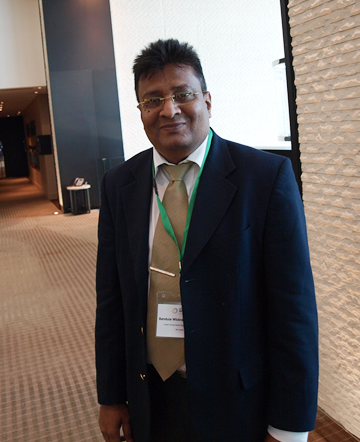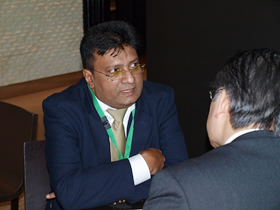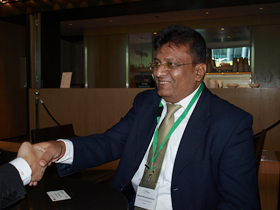Interview with Mr. Bandula Wickramaarachchi, CCD, Sri Lanka
November 2010, at APRSAF-17, Melbourne

The APRSAF Secretariat conducted an interview with Mr. Bandula Wickramaarachchi, Deputy Head / Senior Coastal Engineer of the Research & Design Division, Coast Conservation Department (CCD), Sri Lanka, on the occasion of APRSAF-17 in Melbourne, in late November 2010. Mr. Bandula is involved in implementing an ongoing SAFE prototype of Sri Lanka (Risk of Sea Level Rise in Coastal Zone), and CCD hosted the 2nd SAFE workshop in June 2010.
*SAFE (Space Applications For Environment) is one of the APRSAF initiatives.
To learn about SAFE, please visit the following:
http://www.aprsaf.org/initiatives/safe/
http://www.eorc.jaxa.jp/SAFE/
Q: What do you think about the importance of SAFE programs in APRSAF?
<Wi> Most of the Asian countries are highly vulnerable to climate change impacts. And hence, we have to identify the consequences and impacts of climate change, for formulating adaptation and mitigation measures. SAFE has given more emphasis on climate change. SAFE provides great opportunities to work with space applications to assess and understand the climate change impacts.
Q: How about the shoreline of your country? Do you have any data on the trends of your sea level rise?
<Wi> We have a 1,650km long coastline in Sri Lanka. As an island in the Indian Ocean, most of the coastal areas are threatened by coastal erosion. The sea level rise definitely increases the erosion threats. Further, in some parts, we have already observed that there are some inundations of coastal lands and increased seasonal flooding. These might be due to the sea level rise. We have made sea level measurements since the 1980s. But, the data are yet to be analyzed for determining sea level variations.
Q: Regarding the sea level rise, could you tell us the status of your project in SAFE programs?

<Wi> We started work on the sea level rise with a mini project in 2008. And, we have done some analysis in the southern part of the country. With this analysis, we have found that some areas are inundated. In particular, the lowland areas around inland water bodies are highly vulnerable. The results of the mini project are based on the prediction done by IPCC(Intergovernmental Panel on Climate Change). Now, in the SAFE project, we have moved to the northwestern part of the island. There, we have many lowlands and the risk is much higher. So, we are now in the process of exploring the vulnerabilities with different techniques. Since climate change is a chronic hazard, we cannot say anything straightaway. We have to monitor it for a long time. We are now developing a system for monitoring the consequences of climate change, with special emphasis on the sea level rise.
Q: What do you expect as the results of your project?

<Wi> In our country, 40% of the GDP is generated in the coastal lands. So, we have to look at the issues seriously and we have to be prepared for the raised sea levels. We have now come up with strange interim results in the project. We have found that some shorelines have retreated more than 1 km for the last 30 years. This has occurred to a great extent in the proposed tourist resort project area. The authorities have now been informed about the situation. The project is being reviewed, in order to cope with the situation. Hence, the project results are highly important. Not only that, I realize that SAFE is effective in different aspects, i.e., in training and capacity building. And, the results can be applied in real situations.
Q: What do you expect from the future of the SAFE workshop?
<Wi> In fact, SAFE is contributing a lot to the country in decision making not only for the environment but also in an economic sense. At the workshop, the inputs, comments, and suggestions of experts from different countries and different disciplines are beneficial for achieving enhanced results.
<Secretariat> Thank you very much.